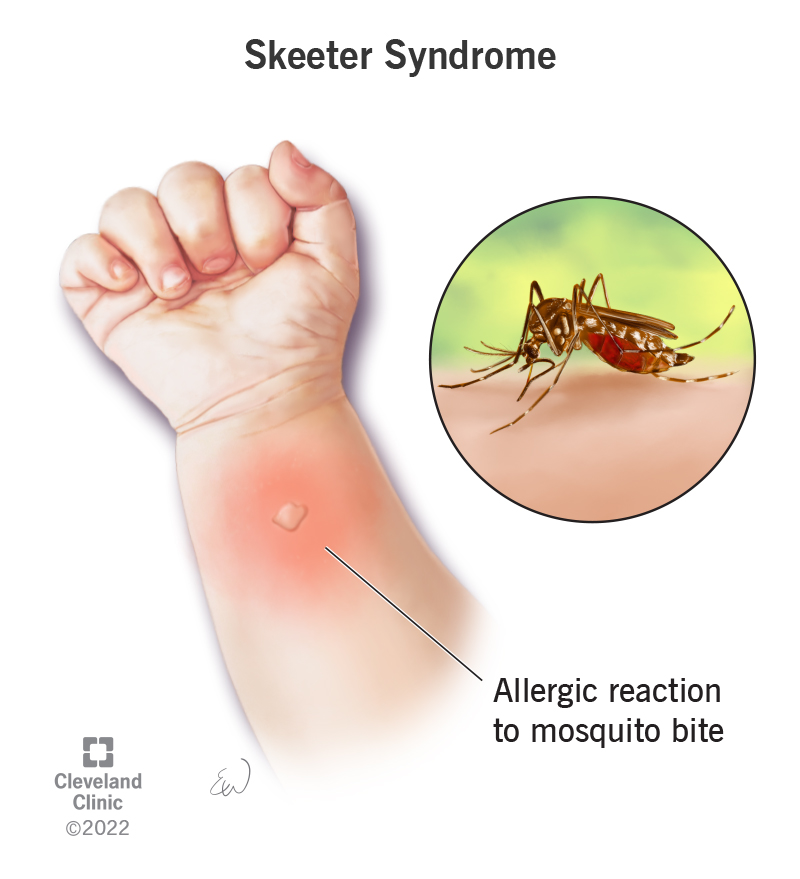If a mosquito bites you and you then develop large areas of swelling eight to 10 hours later, you may have skeeter syndrome. Other symptoms include itching, fever and possibly blisters.
Advertisement
Cleveland Clinic is a non-profit academic medical center. Advertising on our site helps support our mission. We do not endorse non-Cleveland Clinic products or services. Policy

Image content: This image is available to view online.
View image online (https://my.clevelandclinic.org/-/scassets/images/org/health/articles/23289-skeeter-syndrome)
Skeeter syndrome is a large local allergic reaction to mosquito bites marked by significant inflammation. If you have it, you’re allergic to substances in the mosquito’s saliva. Some people have so much swelling that they have trouble moving.
Advertisement
Cleveland Clinic is a non-profit academic medical center. Advertising on our site helps support our mission. We do not endorse non-Cleveland Clinic products or services. Policy
Although it’s relatively rare, skeeter syndrome can affect anyone. However, it often affects children, older adults and others who may have impaired or undeveloped immunity levels. Very young children who haven’t been able to develop an immunity to mosquito bites are the most likely people to develop skeeter syndrome.
You may have had typical reactions to mosquito bites all your life, but then suddenly develop an allergy to the saliva. One reason for this may be changes within your immune system. Another reason for the change may be that you’re highly allergic to the saliva of one type of mosquito but not to another.
With skeeter syndrome, people may develop fever as well as a large local allergic reaction.
Skeeter syndrome may be confused with cellulitis in some cases, especially when the bites happen to young children. Providers may prescribe antibiotics, but antibiotics won’t help skeeter syndrome. Cellulitis, an infection, can happen days after a bite when scratching results in infection.
Symptoms of skeeter syndrome may include:
Advertisement
Skeeter syndrome occurs as a result of an allergic reaction to proteins in mosquito saliva. A mosquito has a long mouthpart called a proboscis that it uses to bite you. The mosquito pierces your skin, sucks your blood and secretes saliva into your bloodstream. Being allergic to the polypeptides in the saliva of a biting mosquito causes skeeter syndrome.
If you’re allergic to these polypeptides, you may see skeeter syndrome symptoms starting about eight to 10 hours after the mosquito bites you. Symptoms typically resolve within three to 10 days.
No. You can’t catch skeeter syndrome from anyone and you can’t give it to anyone.
Your healthcare provider will take a medical history and do a physical examination. They may ask you:
If your provider thinks you have a mild case of skeeter syndrome, they will suggest that you:
If you have a more severe case of skeeter syndrome, you may need to take systemic corticosteroids. Steroids are available as pills or injections.
You should probably recover from skeeter syndrome in three to 10 days.
Skeeter syndrome may last from a couple of days to a couple of weeks. You can go back to work or school when you feel well enough.
The best way to prevent skeeter syndrome is to prevent mosquito bites. This means:
If you have had severe allergic reactions before, your healthcare provider may suggest you carry epinephrine. This medicine is available as an injector that you carry with you.
Advertisement
See your healthcare provider if you’re bitten by mosquitoes and have an extreme reaction. Get emergency help if you find your mouth or throat swelling or if you have trouble breathing.
In general, local allergic reactions to mosquito bites improve spontaneously over time with age, repeated bites or both.
If a mosquito bites you and you develop severe swelling, pain and itching within hours of the bite, you may have skeeter syndrome. You should contact your healthcare provider. However, if you have trouble breathing or other more serious effects, you should get immediate medical help. You can help yourself in the future by making an effort to avoid mosquito bites. Use mosquito repellant, avoid mosquitoes when possible and wear protective clothing.
Advertisement

Sign up for our Health Essentials emails for expert guidance on nutrition, fitness, sleep, skin care and more.
Learn more about the Health Library and our editorial process.
Cleveland Clinic’s health articles are based on evidence-backed information and review by medical professionals to ensure accuracy, reliability and up-to-date clinical standards.
Cleveland Clinic’s health articles are based on evidence-backed information and review by medical professionals to ensure accuracy, reliability and up-to-date clinical standards.
Need care fast? Cleveland Clinic’s Express Care and Urgent Care locations treat everything from sprains to sinus infections — no appointment needed.
